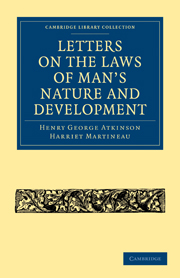Book contents
- Frontmatter
- Preface
- Mottoes
- Contents
- Letter. 1 Inquiry for a Basis
- Letter. 2 Proposal of a Basis
- Letter. 3 Preparation of the Ground
- Letter. 4 What is the Brain?
- Letter. 5 Inquiry about its Structure
- Letter. 6 Early days of Phrenology
- Letter. 7 Inquiry for New Discoveries
- Letter. 8 Methods of New Discovery. Organic Arrangement of the Brain
- Letter. 9 Illustrative Cases
- Letter. 10 Organic Arrangement of the Cerebrum
- Letter. 11 Dr. Howe's Report on Idiocy
- Letter. 12 The Senses and Nervous System
- Letter. 13 Illustrative Comment
- Letter. 14 Facts about the Senses under various conditions
- Letter. 15 Raising questions
- Letter. 16 Bacon, on Matter and Causation. Inferences and Dreams. Association of Ideas
- Letter. 17 Nothing
- Letter. 18 Knowledge and Notions. Results of each
- Letter. 19 Release from Notions. Entrance upon Knowledge
- Letter. 20 Natural History of Superstition
- Letter. 21 Theology and Science
- Letter. 22 Central Law and Pervasive Unity. Light. Sense of Identity. Ghost-seeing. Unrevealed Human Relations
- Letter. 23 Position and Privilege of Truth-seekers
- Letter. 24 Position and Privilege of Truth-speakers
- Appendix
Letter. 2 - Proposal of a Basis
Published online by Cambridge University Press: 29 August 2010
- Frontmatter
- Preface
- Mottoes
- Contents
- Letter. 1 Inquiry for a Basis
- Letter. 2 Proposal of a Basis
- Letter. 3 Preparation of the Ground
- Letter. 4 What is the Brain?
- Letter. 5 Inquiry about its Structure
- Letter. 6 Early days of Phrenology
- Letter. 7 Inquiry for New Discoveries
- Letter. 8 Methods of New Discovery. Organic Arrangement of the Brain
- Letter. 9 Illustrative Cases
- Letter. 10 Organic Arrangement of the Cerebrum
- Letter. 11 Dr. Howe's Report on Idiocy
- Letter. 12 The Senses and Nervous System
- Letter. 13 Illustrative Comment
- Letter. 14 Facts about the Senses under various conditions
- Letter. 15 Raising questions
- Letter. 16 Bacon, on Matter and Causation. Inferences and Dreams. Association of Ideas
- Letter. 17 Nothing
- Letter. 18 Knowledge and Notions. Results of each
- Letter. 19 Release from Notions. Entrance upon Knowledge
- Letter. 20 Natural History of Superstition
- Letter. 21 Theology and Science
- Letter. 22 Central Law and Pervasive Unity. Light. Sense of Identity. Ghost-seeing. Unrevealed Human Relations
- Letter. 23 Position and Privilege of Truth-seekers
- Letter. 24 Position and Privilege of Truth-speakers
- Appendix
Summary
H. G. A. to H. M.
My dear Friend,
By all means let us go into this inquiry and explanation. Nothing will give me greater pleasure; for certainly it is most important that we should form a true estimate of man's nature, and ascertain the real basis of a science of Mind. Men have been wandering amidst poesies, theologies, and metaphysics, and have been caught in the web of ideal creations, and have to be brought back again to particulars and material conditions; to investigate the real world, and those laws of being and action which are the form and nature of things, and the phenomena which they present, as they are here, within us and about us in reality and in truth, and not as we would fancy them to be. There are not two philosophies, one for Mind and another for Matter. Nature is one, and to be studied as a whole. “There is nothing in nature,” says Bacon, “but individual bodies, exhibiting clear individual effects, according to particular laws.” Instinct, passion, thought, &c., are effects of organised substances: but men have sought to make out a philosophy of mind, by studying these effects apart from causes, and have even asserted that mind was entirely independent of body, and having some unintelligible nature of its own, called free will,—not subject to law, or dependent on material conditions; though a man has no more power to determine his own will than he has wings to fly.
- Type
- Chapter
- Information
- Letters on the Laws of Man's Nature and Development , pp. 5 - 10Publisher: Cambridge University PressPrint publication year: 2009First published in: 1851

